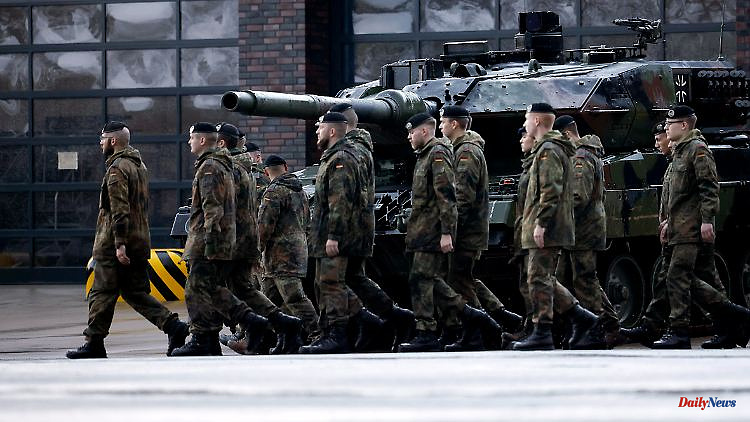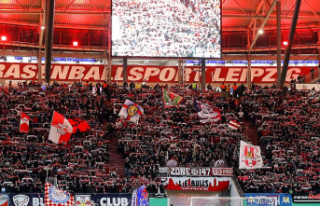In view of the war in Ukraine, the armaments industry has to reposition itself. Not an easy task. In an interview, Andreas Glas from the Bundeswehr University explains how quickly Germany can ramp up its production and who is actually supposed to build all the tanks and weapon systems.
ntv.de: The Russian war of aggression in Ukraine is increasingly becoming a game changer, especially for Germany. Many of the 140 promised Leopard 2 tanks are said to come from German production. This is almost like an economic stimulus package. The armaments industry can look forward to billions in profits, right?
Andreas Glas: First of all: The armaments industry didn't want a war either. But now there is war, and that is why the Bundeswehr also needs the funds in the alliance to be able to guarantee our security. The expectations of the industry are certainly high. The industry will have to make subsequent deliveries, and logically orders will be placed for this. I assume that this material from industrial production will be replaced. However, the armaments industry is not a homogeneous body. Some individual companies will get a particularly large number of orders and others will continue their business comparatively normally.
And yet some are even talking about a "war economy".
The term war economy describes an economic system in a state of war. This is by no means the case in Germany at this point in time. We are not in a state of defense, which would first have to be declared by the Bundestag. A war economy is a clear prioritization of the armed forces. We are still miles away from that.
So why does the term still appear in the current debate?
For me, this is a linguistic radicalization. What those who use it want to point out: The procurement of armaments presents us with great challenges - and I would subscribe to that. One reason for this is the complicated procedural and procurement rules, regulations and administrative procedures. A fundamental reform is needed here. Incidentally, the Federal Armed Forces Procurement Acceleration Act in the summer of 2022 was already a first step. Because of such adjustments, however, Germany is still a long way from becoming a war economy; we remain in the existing market economy system.
The German Bundeswehr is on its last legs, it is a single administration of shortages. Why is Germany currently unable to provide armaments quickly enough? The armaments industry is in the starting blocks.
The Bundeswehr and the defense industry in Germany and Europe are closely related. These cannot be separated. You can't say: the industry is ready, the Bundeswehr is to blame. The same applies the other way around: if systems don't work, it's not only due to the industrial quality of the products, but sometimes also to operation and maintenance by the Bundeswehr. Better equipment is only possible together. The past 30 years of austerity have not only shrunk our military capabilities, but industrial capacities have suffered as well. Anyone who thinks that we can now turn back the wheel in a very short time and that it is only due to the orders is wrong. The Bundeswehr's status quo is closely linked to a radical reduction and shortage of the industrial base. If we want to change that, it can only be done together and not overnight.
How fast could Germany ramp up its armaments production anyway?
That depends very much on what is to be produced. We are talking here very generally about such different goods as vehicles, ammunition, ships, tanks or aircraft. The federal government's special fund is designed for several years. I assume that the fundamental reorganization of the Bundeswehr will take at least three to four years before noticeable results become apparent. With "simpler" products such as ammunition, the first results could show up much faster. However, the current lack of ammunition was already apparent with the start of the enormous consumption in the Russia-Ukraine war. That was about a year ago. The expansion of capacities is currently progressing, but is still lagging behind. The production of tanks, submarines or aircraft can be restarted even less ad hoc. Until now, they have been manufactured in small numbers in manufactories. We are a long way from assembly line production here. A tank cannot be made in days or weeks. We're talking about a much longer period of time here.
What has to happen if Germany wants to play a leading role in strengthening Europe militarily?
The material strength of the armed forces lies in the factories. That means everything we do to get better or more material is ultimately the task of armaments industrial policy. At the moment I have the feeling that other countries are driving the discussion. I plead for a more active role and also for putting major projects to the test or supplementing them. Before major armaments programs actually have an impact in five, ten or 15 years, we must become bolder now. We should also allow interim solutions to quickly provide the Bundeswehr with products that are available on the market. And here German companies definitely have weight. The Bundeswehr is a large army in Europe, very often also a figurehead.
What role does the well-known German armaments company Rheinmetall play? Can the group start production all by itself?
We often look at the big market players, but overlook the fact that Germany still has a very strong medium-sized defense technology sector. Our supply chains are very differentiated. An armored personnel carrier, for example, primarily has a main supplier, such as the project company of KMW and Rheinmetall for the Puma. However, there are a few hundred other companies that, at the next level, produce various assemblies that are used in the production of a tank. And these suppliers have suppliers in turn. At the end of the day, a supply chain consists of thousands of suppliers who are involved in a product. In the discussion, the many hidden champions who make our high-tech performance possible in the first place are often forgotten.
Germany is already suffering from a severe shortage of skilled workers and workers. Who is actually supposed to build all the tanks and weapon systems?
Around 65,000 people work in the armaments industry. That's not much if you look at the product range. In fact, this is a huge bottleneck. The industry has adapted to the order situation and has shrunk over the decades. Staff cannot be increased again so quickly. Above all, highly qualified engineers are needed. Especially when manufacturing special ammunition, for example, manufacturers need safety-qualified personnel. For this reason alone, it is important to develop a very long-term armaments industrial strategy.
Juliane Kipper spoke to Andreas Glas












